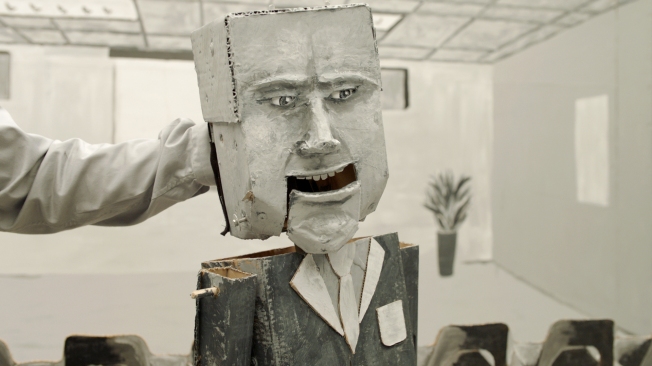
Folkets Bio arranging outdoor screenings, here at Lilla Torg in Malmö, 1989. Photo by Jonn Leffmann (CC, from Wikipedia).
Sebastian Dahlqvist, artist and curator, used to be the chairperson at Folkets Bio (the Peoples’ Cinema) in Lund We asked him about a debate within the Folkets Bio-organization about ten years ago, regarding a formulation in the statutes drawn up by the founders of the organization in 1973. The original founding document claims that Folkets Bio is intended to be “a socialist cinema”.
The definition of the organization as socialist was taken out of the statutes around the same time that we started our own socialist outdoors cinema in 2012. The reasons for the proposition to take this term out of the statutes were several. It was claimed that the financing of local cinemas within the organization was becoming more and more dependent on sponsorships, and that it would be impossible to find sponsors for a cinema which called itself socialist. It was claimed that not all people might feel welcome to visit screenings and to discuss films afterwards if they felt that their political views were not aligned with those of the cinema, which meant that a socialist cinema might not be a cinema for the people (Folkets Bio means The Cinema of the People). It was claimed that most people working within the organization in the noughties had only a vague notion of what socialism was, and no idea at all about what a socialist cinema might be. How could a cinema be socialist?
Kalle: We wanted to ask you about this, since you were chairperson of Folkets Bio in Lund, I don’t know which years?
Sebastian: It was later, maybe 2014-2015. Not that much later, two years after the change was made.
Kalle: So it was still a bleeding wound for Stefan Jarl?
Sebastian: Yes. But it was also an ongoing discussion when I went to the annual congress. It was a question which was continuously debated through propositions to the annual meeting.
Kalle: By people who wanted the original wording put back in the statutes?
Sebastian: Some/several people wanted it put back, people discussed it over coffee afterwards or at the dinner in the evening, saying: have we not lost something vital when this term has been taken out or blurred over?
Kalle: Why did they want it back then?
Sebastian: I think that many of the people I met who wanted it back were mainly older socialists, who maybe worked at older Folkets Bio cinemas around the country for a long period of time. These were people who, according to their own opinion, and it was probably true, had built Folkets Bio into a nationwide organization. And they hadn’t just built a cinema but also they had worked together with an idea about the role of cinema within the body of society, and the possibility of cinema providing perspective or offering us new glasses, or of cinema becoming an interface for meetings and discussions which wouldn’t happen after a visit to SF (ed: SF is a nationwide commercial cinema). And more than anything, to them the work of the cinema was ideologically grounded, it was a part of a socialist movement, or a socialist struggle.
Kristina: Where the cinema-part was just one of the pillars.
Sebastian: Yes, I imagine many people saw it that way.
Kristina: If you Sebastian were to imagine a socialist cinema, what would it be like, what could it be, potentially? What would be the best possible socialist cinema you could imagine? How would it work?
Sebastian: I imagine a socialist cinema as a cinema which could emerge anywhere whenever someone needs it. Out of necessity and need. I don’t know if it would be centrally directed or if it would be comepletely decentralised and what that would mean to the work. But that is how I would like to imagine a possible socialist cinema. One where everyone owns equal shares of the projector, or of the possibility, of the cinema. And then it could scale up or down the concept of cinema, and understand it in different ways. But it would be a cinema which is owned by everyone, and which could emerge anywhere, anytime.
Kalle: And what would be the need that it responds to?
Sebastian: I imagine it would fill this need for an interface for debates and discussions, which one may feel is difficult to create without anything which is held in common. I mean that there is a room and a time which is set aside, which is shared and which is common, and that creates conditions for a conversation which one might feel the need for having. Or that one has the need of showing something, and sharing an experience, to show something which has happened and which must be seen, told or heard of, which a non-socialist cinema would not bother with or which official media would not bother with.
When I attempt to answer your question I feel I’m moving away from a material reality, but if I were to say something about that, I think that if this were to be an activity which needs financing in order to create proper working conditions for those who choose to start up the cinema where it was needed, then I imagine some sort of common… I like and admire your and others work that deals with redistribution of resources, and I think a socialist cinema would be financed by having a large number of people paying a little, to create common pots of resources.
Kristina: Nice to think that the cinema is needed, that it emerges when there’s a need. Seeing film as a form of concentration.





